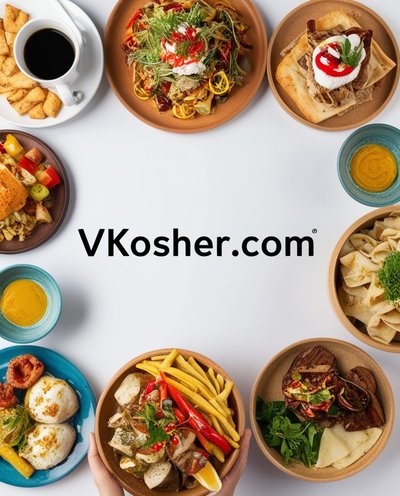Understanding Kosher Food
Kosher food refers to items that conform to the dietary guidelines of kashrut, the Jewish dietary law. These guidelines are derived from the Torah, specifically from the books of Leviticus and Deuteronomy. Kosher rules dictate what is permissible to eat and how food must be prepared to meet these religious standards. The main categories of kosher food include meat, dairy, and pareve (neutral), with strict rules on how these categories can be consumed together. For instance, meat and dairy cannot be consumed at the same meal, and separate utensils must be used for their preparation and consumption.
The Importance of Kosher Certification
For food to be considered kosher, it must be certified by a recognized authority that verifies its compliance with Jewish dietary laws. This certification process is critical for kosher food suppliers, as it assures consumers that the products they purchase meet religious standards. Kosher certification involves inspecting the ingredients, the production process, and the facilities used to ensure that there is no contamination or mixing of kosher and non-kosher products.
Role of Kosher Food Suppliers
Kosher food suppliers play a crucial role in providing access to products that adhere to kashrut. They are responsible for sourcing ingredients and products that meet kosher standards, working with manufacturers to ensure that all aspects of production comply with kosher regulations, and distributing these products to consumers and businesses alike. These suppliers serve a diverse clientele, including Jewish households, restaurants, catering companies, and retailers, all of whom rely on their commitment to maintaining the highest kosher standards.
Challenges Faced by Kosher Food Suppliers
One of the primary challenges faced by kosher food suppliers is the complexity of maintaining strict kosher standards throughout the supply chain. This includes ensuring that all ingredients used are kosher, preventing cross-contamination during production, and adhering to stringent packaging and labeling requirements. Suppliers must also stay updated with the latest regulations and standards set by kosher certification bodies, which can vary between different Jewish communities and regions.
Another challenge is the need to source high-quality kosher ingredients, which can be limited or more expensive than non-kosher alternatives. This often requires suppliers to establish strong relationships with producers who understand and are committed to kosher production. In addition, kosher food suppliers must be vigilant about the potential for mislabeling or fraud in the market, which can undermine consumer trust and the integrity of their business.
The Growing Demand for Kosher Products
In recent years, the demand for kosher products has grown beyond the Jewish community. Many consumers choose kosher foods for perceived health benefits, food safety, and quality assurance. The kosher market has expanded to include a wide range of products, from traditional Jewish foods to contemporary, innovative offerings that appeal to a broader audience. This growth presents both opportunities and challenges for kosher food suppliers, who must adapt to changing consumer preferences while maintaining their commitment to kosher standards.
Innovation in the Kosher Food Industry
Innovation plays a significant role in the kosher food industry, with suppliers constantly seeking new ways to meet the evolving needs of consumers. This includes developing new kosher-certified products, exploring alternative sources of kosher ingredients, and adopting advanced production techniques that enhance efficiency while ensuring compliance with kosher regulations. Suppliers also invest in research and development to create products that meet specific dietary needs, such as gluten-free, organic, or vegan kosher items, catering to a diverse and growing market.
Kosher Food Supply Chain Management
Managing a kosher food supply chain requires meticulous attention to detail and a deep understanding of kashrut. Suppliers must oversee every stage of the supply chain, from sourcing raw materials to delivering finished products to customers. This involves working closely with kosher certification agencies, producers, and distributors to ensure that all products remain kosher throughout the process. Effective supply chain management also involves ensuring that all documentation, labeling, and packaging meet kosher requirements, which can vary by region and certification body.
Global Reach of Kosher Food Suppliers
Kosher food suppliers operate in a global market, sourcing ingredients and products from around the world to meet the needs of their customers. This global reach requires suppliers to navigate different kosher certification standards and regulations in various countries, which can be complex and time-consuming. However, it also allows suppliers to offer a diverse range of products, from traditional kosher foods to international cuisines that have been adapted to meet kosher standards.
The Future of Kosher Food Supply
The future of kosher food supply is likely to be shaped by several key trends, including the increasing demand for high-quality, ethically sourced products, the growth of e-commerce, and the ongoing innovation in food production and packaging. As consumers become more conscious of the ethical and environmental impact of their food choices, kosher food suppliers may need to focus more on sustainability, transparency, and traceability in their supply chains. This could involve adopting new technologies, such as blockchain, to provide consumers with detailed information about the origin and production of kosher products.
Kosher Food Suppliers and Community Engagement
Kosher food suppliers often play a vital role in their communities, not only by providing access to kosher products but also by supporting local economies and fostering connections within the Jewish community. Many suppliers are involved in community events, educational programs, and charitable initiatives, helping to promote the values of kashrut and support those in need. This community engagement is an important aspect of the kosher food industry, reflecting the broader ethical and social principles that underpin kashrut.
Conclusion
Kosher food suppliers are integral to the observance of kashrut, ensuring that consumers have access to products that meet the highest standards of kosher certification. Despite the challenges they face, these suppliers continue to innovate and adapt to the changing needs of the market, providing a wide range of products that appeal to both traditional and modern consumers. As the demand for kosher products grows and evolves, kosher food suppliers will remain at the forefront of the industry, upholding the principles of kashrut and contributing to the global food landscape.




